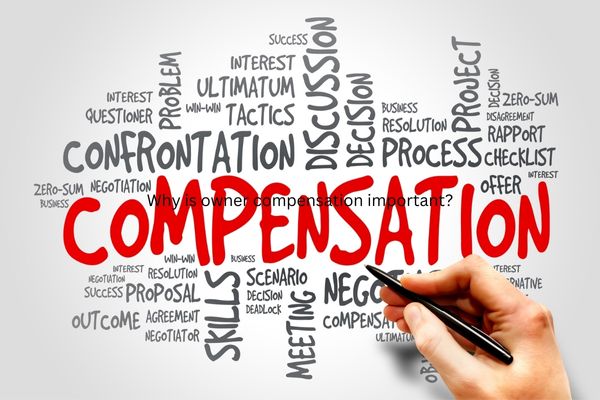When it comes to business expenses, one of the simplest things to ignore as a business owner is your own pay.
According to the 2016 American Express OPEN Small Business Monitor, slightly more than half of business owners (51 percent) pay themselves a salary. But, Alice Bredin, a B2B marketing entrepreneur and small company counselor for OPEN, underlined the necessity of budgeting for your own compensation as soon as you can afford to.
Why is owner compensation important?

“It’s necessary for you and your organization to compensate yourself,” Bredin stated. “If you are not allocating funds for your own compensation, your records do not fairly reflect the health of your firm, since your expenses are missing a big cost, namely you. You won’t know if you need to raise pricing, market more, lower expenditures, or make other modifications to help your firm prosper unless you include in all expenses.”
You may be tempted to work for free, but remember that your time is valuable. “Some entrepreneurs work for free for far too long,” Evan Singer, CEO of SmartBiz Loans, a Small Business Administration (SBA) loan provider, said. “It comes as no surprise that tension and concern about personal money are not conducive to starting and sustaining a business.” If you’ve started a small business, you should recognize that your time is valuable.”
Owner compensation and tax implications

There’s another reason to pay yourself as a small business owner: depending on your company’s organizational structure, you may be able to deduct a personal wage from your overall business income.
“If you make $100,000 a year in your firm and file as a sole proprietor: Self-employment tax – which includes Social Security and Medicare – will be computed off the entire $100,000,” noted Whitney Delaney, founder of Delaney Tax & Wealth Management. “But, if you are a S corporation and pay yourself a salary, your [deductions] will be based only on your income rather than your total net sales.”
When will you be able to start paying yourself?

When money is scarce, the compensation of the owner is frequently the last priority on the small business budget. Yet, as your business income grows more reliable, you will be able to pay yourself.
To evaluate if you’re ready to start paying yourself a wage, Delaney suggests asking yourself three questions:
- Do I have consistent revenue?
- Is my projected revenue consistent?
- Is my company profitable?
Delaney believes that if you can answer “yes” to all three questions, you can afford to pay yourself. Singer concurred, stating that organizations that have progressed beyond the startup stage and are more established might consider planning for owner compensation.
What factors influence your pay?

The IRS recommends that business owners pay themselves a “reasonable remuneration.” So how do you know what’s reasonable?
“I recommend giving yourself a small wage, as small as you can afford,” Delaney added. “Following the fiscally conservative path means you’ll pay fewer taxes, which means you’ll have more money to invest in your firm.”
These are two common methods for calculating your salary:
- Personal expenses should be factored into your income.
- Profit distributions can be used as remuneration.
Personal expenses should be factored into your income.
Bredin suggests calculating your fundamental personal expenses first before determining your pay. Based on that figure, go over your business data and see what risks you can afford to take.
“Calculating what that salary figure should be might be difficult, and because it’s so tricky, I recommend consulting the accountant who files your taxes for help on how much to pay yourself,” Delaney added.
Salary from profit distributions
Another option is to pay yourself based on your profits. According to the SBA, most small business owners limit their wages to 50% of profits, according to Singer. However, he added that even the SBA lacks a precise answer on pay for small business owners because the amount is largely dependent on the stage of development of a business.
“To assist you, the SBA maintains an income statistics database,” Singer explained. “The database contains information such as earnings by occupation and education, income statistics, and results from a national compensation survey.” This data will not only help you establish your own compensation, but it will also tell you if the salaries you are paying your staff are reasonable.”
Singer advises business owners that no matter which pay model they adopt, they must guarantee that their salaries do not interfere with day-to-day operations. “A small business’s cash flow can make or break it.”
5 suggestions for determining your compensation

Following the advice of Bredin, Delaney, Singer, and other experts, here are some general guidelines for arranging owner compensation for a small business or solo operation:
- Pay yourself a regular income equivalent to a percentage of your typical monthly profit if your business is established and profitable.
- Set your monthly wage to an amount that will not put a strain on your company’s budget at any moment.
- To lower your self-employment tax liability, consider changing your tax status or organization type to an S corporation.
- Accept other profit distributions on a regular basis, but only when they will not be a burden to the business.
- Review your salary as part of your overall remuneration on a regular basis and adjust it up or down based on the company’s income and cash needs.
Of course, determining your compensation as a business owner entails making important decisions about your personal and corporate taxes. Get the assistance of an expert for these issues. Consult with your CPA before making any major decisions. If you don’t, find someone who can.















